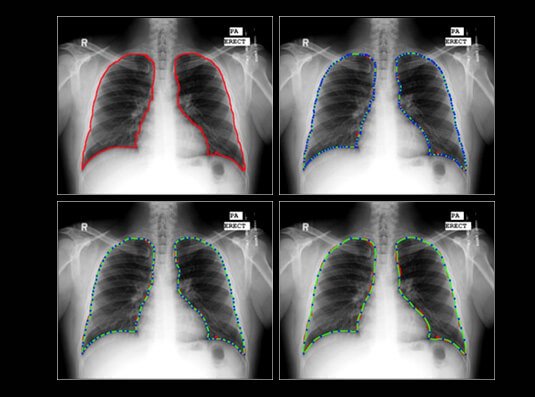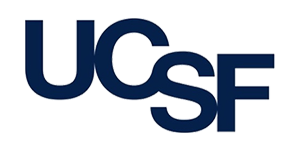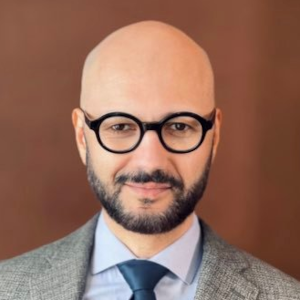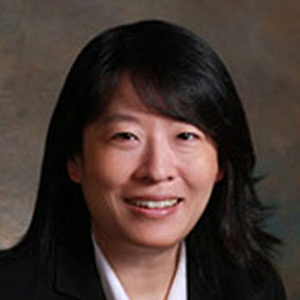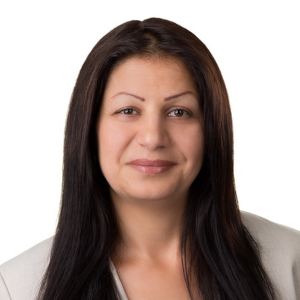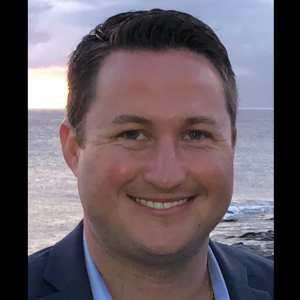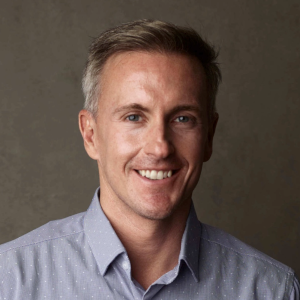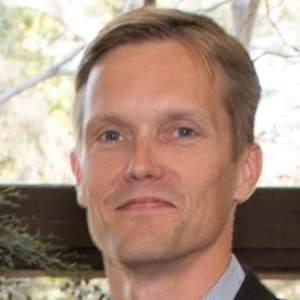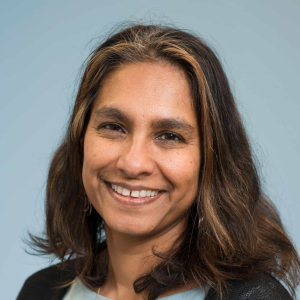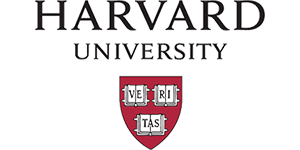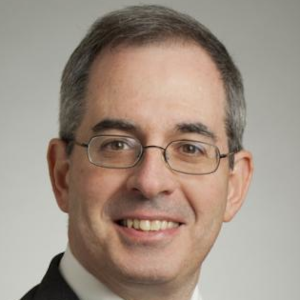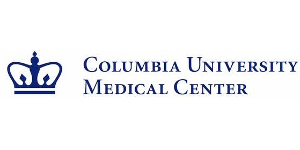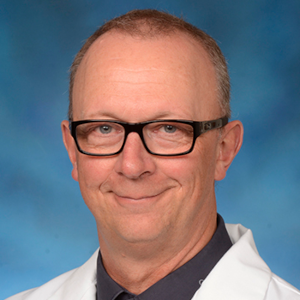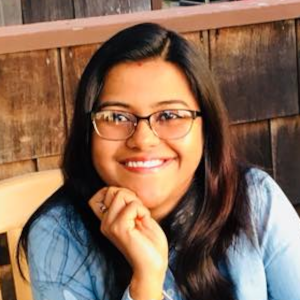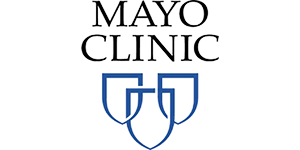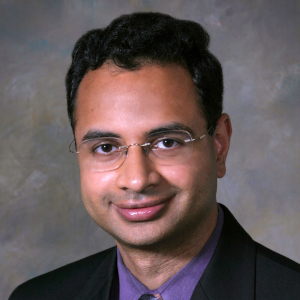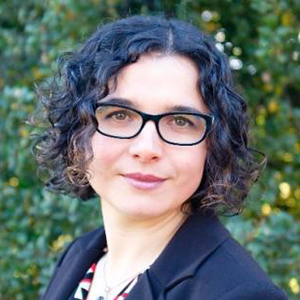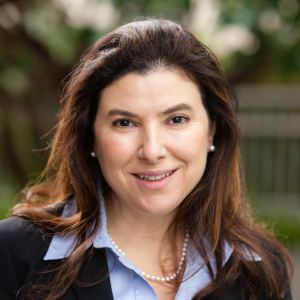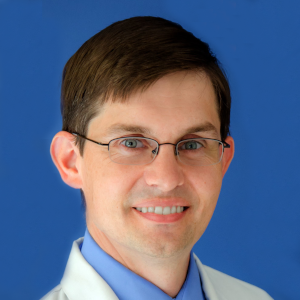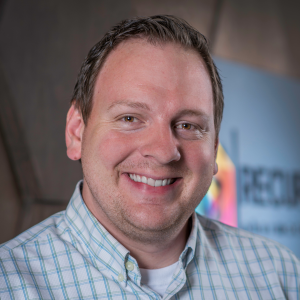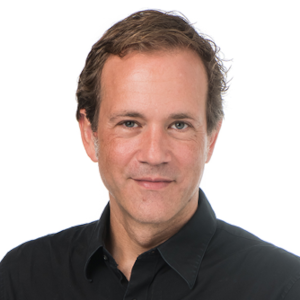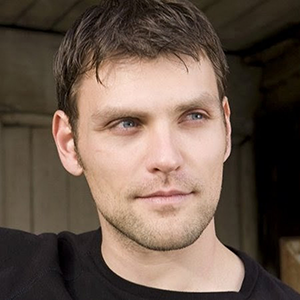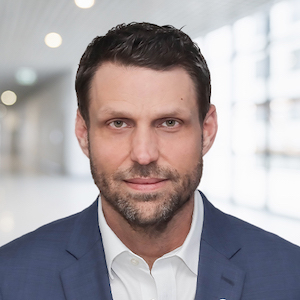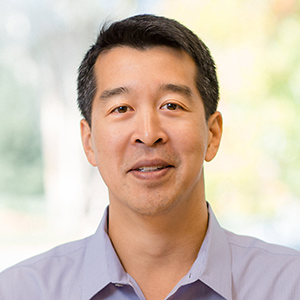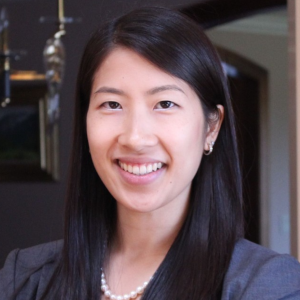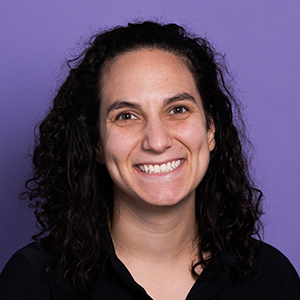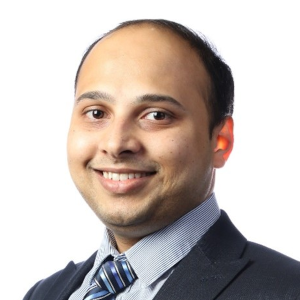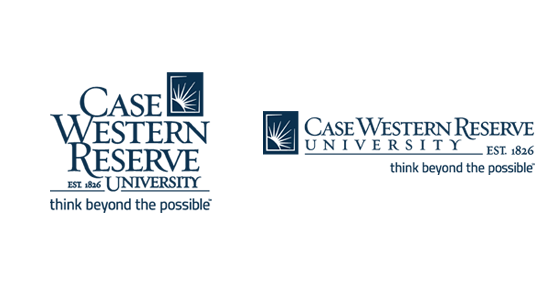Track Chairs:
Sharmila Majumdar, UCSF
The use of Artificial Intelligence (AI) in diagnostic medical imaging is undergoing extensive evaluation. AI has shown impressive accuracy and sensitivity in the identification of imaging abnormalities and promises to enhance tissue-based detection and characterization. This track will explore technical advancements in clinical machine learning and use cases in radiology.
Sessions:
- AI Roadmap: Opportunities and Challenges (PANEL)
Session Chair: Sean Khozin, CancerLinQ
- Matthew Lungren, AWS
- Patrick Loerch, Gilead
- Greg Yap, Menlo Ventures
- Lydia The, McKinsey & Company
- Chris Gibson, Recursion
- Andrea Mazzocchi, Known Medicine - Actionable AI: Empowering the Stewards of Precision Medicine
- Martin Stumpe, Tempus - Technical Advancements in Clinical Machine Learning - What's New in 2022 (PANEL)
Session Chair: Sharmila Majumdar, UCSF
- Matthew Lungren, AWS - Jayashree Kalpathy-Cramer, Harvard
- John Mongan, UCSF - Image Applications for Clinical Diagnosis
Session Chair: Esther L. Yuh, UCSF
- Thorsten Fleiter, U. of Maryland
- Imon Banerjee, Mayo Clinic
- Pratik Mukherjee, UCSF
- Lawrence Schwartz, Columbia University Medical Center
- Rakesh Shiradkar, Case Western Reserve University - The Impact of AI and High-Resolution Digital Slide Imaging
Session Chair: Ryan Davis, Epredia
- Andy Moye, Paige
- Thomas Westerling-Bui, Aiforia
Session Chair: Fatemeh Zabihollahy, UCLA
- Mirabela Rusu, Stanford
- Mona Flores, NVIDIA
- Kilian Koepsell, Caption Health
- Eric Horler, AIQ Solutions
Session Chair Profile
Biography
Sharmila Majumdar, Ph.D., obtained her Ph.D. degree from Yale University in Engineering and Applied Sciences. After a short stay at Yale she joined UCSF as an Assistant Professor in 1989. Her research on machine and deep learning has a focus on imaging; prior work has focused on imaging technology development and translational, development of image processing, computer vision has been focused in the areas of osteoporosis, osteoarthritis, and lower back pain. She is the Executive and Scientific Director of the Center for Intelligent Imaging at UCSF. She was selected as a fellow of the American Institute of Medical and Biological Engineers in 2004, a fellow of the International Society of Magnetic Resonance in Medicine (ISMRM) in 2008, and awarded the ISMRM Gold medal in 2016. She is an active participant in the PMWC meetings. Her work over the last three decades has been extensively supported by the NIH and industry.
Session Chair Profile
Biography
Dr. Khozin is an oncologist and physician-scientist, currently serving as Chief Executive Officer of CancerLinQ, a company focused on advancing cancer care quality and research. Previously, he was Global Head of Data Strategy and Data Science Innovation at J&J, leading a worldwide multidisciplinary team charged with the design and implementation of pioneering data science solutions to support the development of innovative medicines. Before joining J&J, Dr. Khozin led FDA Oncology Center of Excellence’s bioinformatics, regulatory science, and clinical trial innovation efforts and was the founding Executive Director of Information Exchange and Data Transformation (INFORMED), the FDA’s first data science and technology incubator that played a pivotal role in the agency’s technology modernization efforts. Before his tenure in federal government, Dr. Khozin was the cofounder of Hello Health, a company focused on developing integrated telemedicine, point-of-care data visualization, and advanced analytical systems for optimizing patient care and clinical research.
Session Chair Profile
Biography
Dr. Yuh is a neuroradiologist and physicist who interprets images of the brain, neck and spine as attending physician at UCSF and at Zuckerberg San Francisco General Hospital. She works with UC Berkeley computer scientists and UCSF radiologists on machine learning algorithm applications in traumatic brain injury. She ed FDA approval in 2019 of the first-ever imaging biomarker to select patients for traumatic brain injury therapeutic clinical trials, under the FDA’s Medical Device Development Tool (MDDT) program. A graduate of Stanford University School of Medicine, she completed training in radiology and neuroradiology at UCSF in 2009. She has been nominated for the UCSF Exceptional Physician Award, and is a prior Outstanding Teaching Fellow of the UCSF Department of Radiology and Biomedical Imaging.
Session Chair Profile
Biography
I am a postdoctoral scholar at the University of California, Los Angeles. My research has focused on the development and application of novel artificial intelligence and medical image analysis techniques in the detection, diagnosis, and staging of cancer disease. I received my master's and Ph.D. in Electrical and Computer Engineering both from Carleton University in 2016 and 2020, where my Ph.D. work has been awarded the university medal for outstanding graduate work at the doctoral level. I then joined Johns Hopkins University as a postdoctoral scholar where I worked with colleagues in the Department of Radiation Oncology to design and implement AI-based methods for real-time MR-guided gynecologic cancer radiation therapy. I joined UCLA in September 2021. I have worked as an R&D engineer in the medical device industry for several years.
Session Chair Profile
Biography
Has been a member of the medical equipment industry for 12 years, serving in a variety of roles. Focus on digital pathology and AI, as a member of the DPA and ESDIP boards. Strong focus on making digital pathology and AI digestible for facilities to understand how it will impact their work.
Speaker Profile
Biography
Dr Lungren was an interventional radiologist and research faculty at Stanford University Medical School where he led the Stanford Center for Artificial Intelligence in Medicine and Imaging (AIMI). He served as advisor for dozens of early stage startups and large fortune-500 companies on healthcare AI go-to-market strategy. His work has led to more than 100 scientific publications. Dr. Lungren is frequently featured in national news outlets such as NPR, Vice News, Scientific American, and he regularly speaks at national and international scientific meetings on the topic of AI in healthcare. Finally, Dr. Lungren is also a top rated instructor on Coursera where his AI in Healthcare course designed especially for learners with non-technical backgrounds has been completed by more than 10k students around the world.
Speaker Profile
Biography
Patrick Loerch has over 20 years of experience in data sciences, real world evidence and genomics research spanning all phases of R&D within the pharmaceutical industry. Dr Loerch currently serves as Senior Vice President, Clinical Data Sciences at Gilead Sciences. In addition to oversight of the Biometrics, Clinical Bioinformatics and Real World Evidence organizations, Dr. Loerch is accountable for the build out and integration of Enterprise Data Sciences capabilities to accelerate the discovery, development and delivery of new medicines. Dr. Loerch’s prior roles include leadership positions at Johnson & Johnson, Celgene and Merck. He began his career at Rosetta Inpharmatics, a genomics start-up in Seattle, WA that was later acquired by Merck. Dr. Loerch received his PhD in Biostatistics from the Harvard University and his BS in Biochemistry from Washington State University.
Speaker Profile
Biography
Jayashree Kalpathy-Cramer is the Director of the QTIM lab and the Center for Machine Learning at the Athinoula A. Martinos Center for Biomedical Imaging and an Associate Professor of Radiology at MGH/Harvard Medical School. An electrical engineer by training, she worked in the semiconductor industry for a number of years. After returning to academia, she is now focused on the applications of machine learning and modeling in healthcare. Her research interests include medical image analysis, machine learning and artificial intelligence for applications in radiology, oncology and ophthalmology. The work in her lab spans the spectrum from novel algorithm development to clinical deployment. She is passionate about the potential that these techniques have to improve access to healthcare in the US and worldwide. Dr. Kalpathy-Cramer has authored over 200 peer-reviewed publications and has written over 10 book chapters.
Speaker Profile
Biography
Lawrence H. Schwartz, M.D. is the James Picker Professor and Chairman of the Department of Radiology at Columbia University Medical Center and is also Radiologist-in-Chief at New York-Presbyterian Hospital/Columbia University Medical Center. In his capacity as Chairman, Dr. Schwartz oversees a 75 clinical member department and directs its patient care, research and educational initiatives. Before joining Columbia, Dr. Schwartz was on the faculty at Memorial Sloan-Kettering Cancer Center for approximately 18 years, most recently as the Vice Chair, Technology Development in the Department of Radiology as well as Director of MRI. Dr. Schwartz’s academic interests are in the development of novel imaging biomarkers in oncology, both clinical care and drug discovery. He is an active member of the Quantitative Imaging Biomarker Alliance and the Oncology Biomarker Qualification Initiative.
Speaker Profile
Biography
Thorsten Fleiter is a member of the radiology team at the Nation’s first and only integrated Trauma Hospital concentrating on the development of new imaging methods applying AI and robotic techniques to create autonomous systems to shorten the time lost for the detection of life-threatening injuries in severe trauma. The goal of his group is to create less user independent solutions specifically for pre-hospital and remote scenarios to ultimately improve the survival of trauma victims. He led the development of novel imaging methods for ultrasound and computed tomography primarily for emergency imaging and developed multiple advanced acquisition and visualization methods including 4D-ultassound, virtual bronchoscopy/colonoscopy as well as new tools for precision surgery guidance using novel 3D printing methods for spine, facial bone, and dental applications. His group earned several awards for the advanced visualization and simulation of dynamic processes like blood- and airflow to predict pathophysiological changes of aneurysms and stents.
Talk
Applying AI techniques in Severe Trauma Imaging
Routine sub-millimeter scans of the entire body of trauma victims are typically producing 3000-5000 images that must be reviewed instantaneously to detect life threatening injuries. New AI image analysis tools and workflow alterations to further improve this process and shorten the turnaround times will be discussed in this presentation.
Speaker Profile
Biography
I am an Associate consultant and lead AI scientist in Mayo Clinic Arizona. I am affiliated within ASU School of Computing and Augmented Intelligence. Before joining Mayo clinic, I was working as an Assistant Professor in Emory University with joint affiliation in Georgia Tech. I did my postdoc training from Biomedical data science department at Stanford University and completed my doctoral degree in Computer Science as a Marie Curie fellow from National Council of Research, Italy. My current research is focused on unstructured medical data analysis and integration of multisource medical data from varying hospital systems for building predictive model to benefit cancer diagnosis and treatment. I successfully lead multiple federal and non-federal research projects related to machine and deep learning based research projects. I am currently leading multiple innovative multi-institutional research projects related to cancer informatics which involves both academic (Emory, Duke, Stanford, Harvard, Intermountain, IU) and industrial (Philips, GE healthcare) partners.
Talk
Fusion of Multi-modal Data for Clinical Event Prediction
Even though advancements in deep learning techniques carry the potential to make significant contributions to healthcare, most of current models consider only a single input data stream without incorporating data that can inform clinical context. Yet in practice, non-imaging data based on the clinical history and laboratory data enable physicians to interpret imaging findings in the appropriate clinical context, leading to a higher diagnostic accuracy. Models must also achieve the capability to process contextual clinical data in addition to pixel or other sensor data. This talk will present multiple fusion machine learning methodologies including graph-based models, with boosted performance by integrating the clinical context with the imaging data applied to different clinical context.
Speaker Profile
Biography
Dr. Mukherjee is a clinical neuroradiologist whose research involves technical development and basic and clinical neuroscience applications of methods for mapping tissue microstructure, connectivity and function in the human brain. Recent work includes diffusion MRI, resting state fMRI and magnetoencephalography (MEG) to study cerebral connectivity, including the whole-brain macroscale network known as the “connectome”, in human brain development, neurodevelopmental disorders and traumatic brain injury (TBI). He has special experience in standardizing structural MRI, diffusion MRI, and fMRI for large-scale multi-site projects and managing the resulting Big Data using cutting-edge informatics platforms and machine learning analytics, which is essential for the clinical translation of new imaging technology. He is a PI and Imaging Core leader of the Transforming Research and Clinical Knowledge in TBI (TRACK-TBI) US nationwide study and also a PI and Clinical Team Leader of two NIH Brain Research through Advancing Innovative Neuro-technologies (BRAIN) grants to produce transformational advances in ultra-high field brain MR imaging technology.
Talk
Artificial Neural Networks for Understanding Human Brains
Artificial neural networks (ANNs), including deep learning, were originally inspired by biological neural networks. In turn, ANNs are now being used to study the human brain. We show that deep learning of fMRI can map the brain’s hierarchical functional organization by detecting “meta-networks” that represent interactions of low-order intrinsic connectivity networks.
Speaker Profile
Biography
Dr. Mirabela Rusu received a Master of Engineering from the National Institute of Applied Sciences, France and her MS and PhD in Computational Biomedicine from University of Texas Houston. During her postdoctoral training at Case Western Reserve University, Dr. Rusu developed computational tools for the integration and interpretation of multi-modal medical imaging data. Dr. Rusu joined GE Global Research in 2015 as an Image Analysis Scientist and developed analytic methods for biomedical data interpretation. Since 2018, Dr. Rusu leads the Personalized Integrative Medicine Laboratory (http://pimed.stanford.edu) which focuses on developing analytic methods to spatially align radiology and pathology images in patients that undergo surgery for cancer treatment. Moreover, her team uses the registered data to label the radiology images and extract pathomic MRI biomarkers that allow the training of deep learning models to automatically detect and distinguish indolent from aggressive prostate cancer on MRI.
Speaker Profile
Biography
Dr. Flores oversees NVIDIA’s AI initiatives in medicine and healthcare to bridge the chasm between technology and medicine. Dr. Flores first joined NVIDIA in 2018 with a focus on developing the healthcare ecosystem. Before joining NVIDIA, she served as the chief medical officer of digital health company Human- Resolution Technologies after a 25 + year career in medicine and cardiothoracic surgery. She received her medical degree from Oregon Health and Science University followed by a general surgery residency at the University of California at San Diego, a Postdoctoral Fellowship at Stanford, and a cardiothoracic surgery residency and fellowship at Columbia University in New York. Dr. Flores also has a Master of Biology from San Jose State and early in her career received an MBA from the University at Albany School of Business. She initially worked in investment banking for a few years before pursuing her passion for medicine and technology.
Speaker Profile
Biography
Dr. Mongan's research focuses on artificial intelligence in medical imaging. He was the senior author and primary investigator on a project that developed artificial intelligence for the detection of pneumothorax (collapsed lung); in partnership with General Electric, the algorithm developed in this project achieved FDA clearance and is currently commercially available on portable X-ray machines. He is the lead author on the Checklist for Artificial Intelligence in Medical Imaging (CLAIM), a guideline used by several journals to promote reproducibility in artificial intelligence publications, and is the lead author on a publication drawing lessons for the safe implementation of artificial intelligence in medicine from the 737 Max disasters. He chairs the Machine Learning Steering Committee of the Radiological Society of North America (RSNA, the world’s largest radiology specialty society) and serves on the editorial board of the journal Radiology: Artificial Intelligence.
Speaker Profile
Biography
Chris developed the technology and approach that seeded Recursion as part of his MD/PhD work in the lab of Co-Founder Dr. Dean Li (current President of Merck Research Labs) while at the University of Utah. After completing his Ph.D., Chris left medical school to build Recursion into the rapidly growing company it is today. Chris is a graduate of Rice University with degrees in bioengineering and management. Chris serves on the Board of BioUtah and is the Chair of BioHive, the public-private partnership driving expansion of Utah's life-science ecosystem, the fastest growing in the nation. Chris is also active as an advisor and mentor, both formally and informally, of many young biotech founders. Chris enjoys cycling on both the road and the trails that cut through Utah's great wilderness, as well as spending time with family.
Speaker Profile
Biography
Caption Health CTO and Co-Founder Kilian Koepsell leads the company’s efforts to use the latest in artificial intelligence and deep learning to bring the diagnostic power of ultrasound to more healthcare providers, democratizing access to healthcare and improving patient outcomes. Prior to co-founding Caption Health, he worked on developing computer vision algorithms matched to the human visual processing system at the Redwood Neuroscience Institute and UC Berkeley — research he brought to Caption Health’s ultrasound guidance software. He also founded White Matter Technologies and served as a Senior Scientist at IQ Engines, which was acquired by Yahoo! for its Flickr group.
Speaker Profile
Biography
Dr. Martin Stumpe leads Tempus' Artificial Intelligence and Data Science department, which includes teams applying modern machine learning to medical images, genomic data, clinical data, and other data modalities across diseases, with a particular focus on oncology and cardiology. Before joining Tempus, Martin was Head of the Pathology team at Google, where he founded and led a team of engineers and scientists to build AI applications to improve cancer diagnostics. Earlier in his career, Martin worked on planet-scale computer vision applications in Google Street View, developed algorithms for the detection of extrasolar planets while at NASA Ames on the Kepler mission, and worked on molecular dynamics simulations to elucidate aspects of protein folding and denaturation while at Stanford. Martin holds a Dr. rer. nat. from the Max Planck Institute for Biophysical Chemistry and University of Goettingen, Germany.
AI and Data Science Showcase:
Tempus
Tempus, a technology company advancing precision medicine through artificial intelligence. With one of the world’s largest libraries of clinical and molecular data, an operating system to make it accessible, Tempus enables physicians to deliver personalized care and facilitates discovery, development and delivery of optimal therapeutics.
Actionable AI: Empowering the Stewards of Precision Medicine
Use Cases of AI that enable pathologists to do what they couldn't before; Predicting Molecular Features from H&E slides surfacing targeted therapies and clinical trials for their patients.
Speaker Profile
Biography
Dr. Andy Moye is a seasoned commercial leader and corporate development executive who has worked across the molecular diagnostics, biotechnology and life sciences industries. He is currently Chief Executive Officer at Paige and previously served as Chief Commercial Officer, where he led the company’s clinical sales and commercial strategy, including the U.S. launch of Paige Prostate, the first and only AI-based pathology product to receive FDA approval for in vitro diagnostic (IVD) use in detecting cancer in prostate biopsies. Previously, Dr. Moye served as Head of Commercial Operations in North America and Latin America for the Digital and Computational Pathology division of Philips, delivering significant growth in both markets for the emerging business. Dr. Moye has also served in executive roles at leading healthcare companies including Ontada, a division of McKesson, Caris Life Sciences, and WaferGen Bio-systems, now part of Takara Bio.
Speaker Profile
Biography
Dr. Thomas Westerling-Bui received his PhD in cancer biology, focusing on the cell cycle and transcription, from the University of Helsinki Medical School in Finland. He completed a post-doctoral EMBO fellowship at the Dana Farber Cancer Institute in Boston, researching the genomics of breast and prostate cancer. Thomas joined Aiforia to advance the new potential of cancer biology, pathology, big data, and artificial intelligence.
AI and Data Sciences Showcase:
Aiforia
Aiforia equips pathologists and scientists with powerful deep learning artificial intelligence for translating images into discoveries, decisions, and diagnoses. The cloud based Aiforia software aims to escalate the efficiency and precision of preclinical and clinical medical image analysis from oncology to neuroscience and more.
Bringing Precision to Diagnostics with Deep Learning
Deep learning artificial intelligence enables increased speed, accuracy and consistency in medical image analysis. Aiforia's automated, AI-driven solutions supports pathologists in diagnosing some of the most prevalent cancers like breast and lung with greater efficiency and precision; paving the path for personalized therapy.
Speaker Profile
Biography
Greg invests in teams trying to solve major problems in life science and digital health, with a special interest in novel therapeutic platforms, digital health, and transformative technologies. Prior to entering investing, Greg served for more than 20 years in senior executive and entrepreneurial roles in life sciences and digital health. He was CEO and co-founder of two startups (Biodesy in protein analysis & therapeutics and PyrAmes in digital health & remote monitoring). At Roche/Ventana, Greg led a global market-leading cancer diagnostic assay business, serving 20 million patients and delivering $500 million revenue per year. Greg was also an EIR at Illumina Ventures, the first healthcare EIR at GE, VP/GM at Affymetrix, and consultant for McKinsey. Greg received his bachelor’s degree in molecular biology (summa cum laude) from Princeton and his MBA from Stanford. Greg is an Aspen Health Innovators Fellow and a member of the Aspen Global Leadership network.
Speaker Profile
Biography
Dr. The is a leader in our Life Sciences practice, where she serves biotechs and pharmacos on R&D strategy. She is also a leader in overall service line for high-growth biotech clients. She is a leader in McKinsey’s Center for Asset Optimization where she develop R&D strategy, for platform technologies, portfolios and individual assets. In the past ten years, she has developed portfolio and platform strategies for 20+ biopharma companies. Throughout her work, she focus on helping companies deliver transformational therapies to maximize patient benefit. She received her Ph.D. in Molecular & Cell Biology at UC Berkeley, where she studied the molecular mechanisms of atopic dermatitis and was supported by an NSF Graduate Research Fellowship.
Speaker Profile
Biography
Andrea Mazzocchi, PhD completed her PhD in biomedical engineering from Wake Forest School of Medicine and received her BS in Biomedical Engineering from Rochester Institute of Technology. She has spent the past several years focused on cancer biology, tissue engineering, and biomaterials. Her research has focused on the intersection of these fields to generate a cancer precision medicine platform. Known Medicine marries this patient-specific wetlab approach with data science to generate biological, computational, and clinical insights to improve cancer patient lives.
Speaker Profile
Biography
Dr. Rakesh Shiradkar is a research faculty in Biomedical Engineering at Case Western Reserve University. He obtained his PhD in Electrical and Computer Engineering from the National University of Singapore in 2014 and joined Case Western Reserve University as a post-doctoral researcher. His research focuses on developing machine learning and artificial intelligence methods in conjunction with quantitative and conventional MRI for image-based diagnosis and prognosis of prostate cancer. He also works on integrating multi-modal data such as MRI, pathology, genomics for developing reliable and robust methods for cancer diagnostics. He has also been exploring methods for addressing health disparities in prostate cancer using AI.
He has been leading multi-institutional projects on cancer diagnostics and is the PI on a 3 year DoD early career award and a Pilot Award from the Case Comprehensive Cancer Center. He has published extensively on prostate imaging AI in more than 20 high impact journals and conference proceedings.
Talk
Computational Imaging Biomarkers for Imaging based Cancer Diagnosis
Imaging plays a significant role in non-invasive diagnosis and assessment of cancer, but is limited by inter-observer variability and confounders. This talk will demonstrate the potential of computational imaging biomarkers in quantifying cancer heterogeneity for improving diagnosis and also prognosticating treatment outcomes from pre-treatment imaging.






